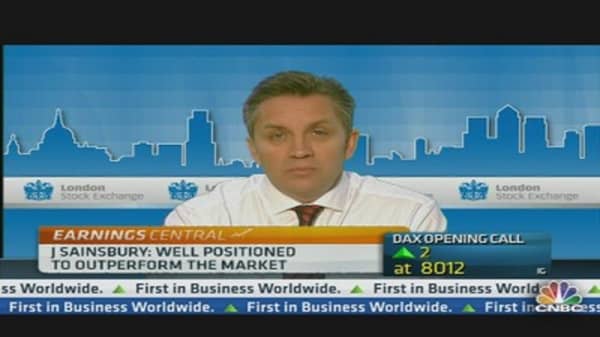The operator of the U.K.'s third-biggest supermarket chain J Sainsbury, beat expectations on Tuesday with quarterly like-for-like sales (excluding fuel) rising by 3.6 percent. Analysts polled by Reuters had expected a rise of just 2.3 percent.
"They are strong figures," CEO Justin King told CNBC but warned that the economic climate could weigh on trading in the coming year.
"We expect the challenging economic environment to continue through the coming year," he said in a press release.
King said non-food sales had been extremely strong, growing at three-times the rate as food sales.
Sainsbury sales rose 2.2 percent in early trading on Tuesday.
"We had a good run in Sainsbury's [shares] yesterday... and the news has just gotten better and better with today's numbers," Angus Campbell, head of market analysis, Capital Spreads told CNBC.
Total sales for the fourth quarter were up 6.3 percent (excluding fuel). Weekly customer transactions increased by over 800,000 year-on-year, coming at a difficult time for U.K. supermarkets after the fallout from the horse meat scandal.
(Read More: Horse Meat Applicant's Food Safety Is Questioned)
Sainsbury's is thought to be benefiting from the horse-meat scandal that has rocked the industry. The supermarket has found no trace of horse meat in its products, in contrast with its rivals Asda and Tesco.
"I do think that of course as you're going around a supermarket if you're aware that supermarket has had difficulties in its supply chain then you may be less likely to buy certain products," he said.
(Read More: We'll Cut Costs to Survive: Sainsbury CFO)
King said that Sainsbury's was able to remain competitive despite vigorous price comparison checks being pushed by rivals that allowed consumers to watch price differences more closely. He was also adamant that J Sainsbury is able to turn promising top-line figures into profit. "We're not updating on profits today but there is an expectation for this year in the marketplace, we're comfortable with that expectation and that would mean that our profits have grown year-on-year. Of course it is the case that some of our competitors have seen declines in the last year but that's a measure of how competitive this market is," he said.
"I think we can demonstrate that sales growth does convert into profit."
Correction: An earlier version of this story incorrectly stated in the headline that Sainsbury's profit beat estimates. It should have said sales.




